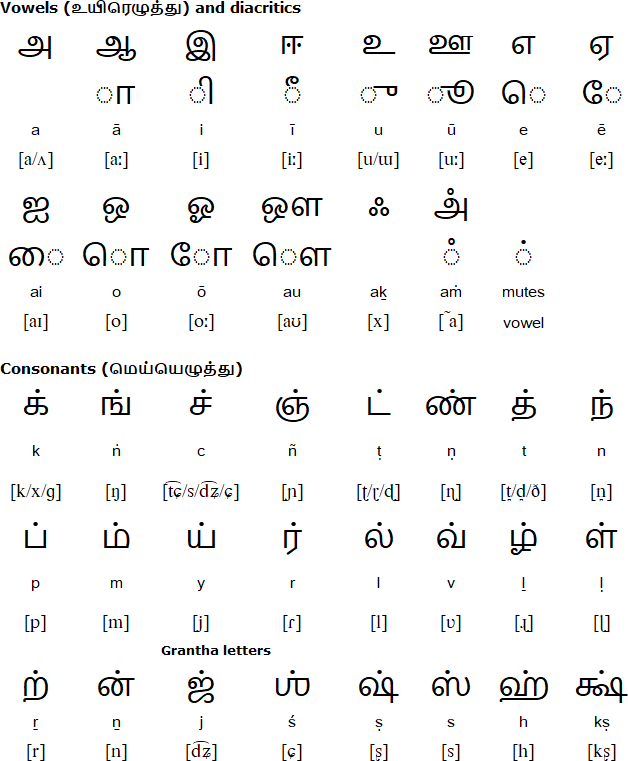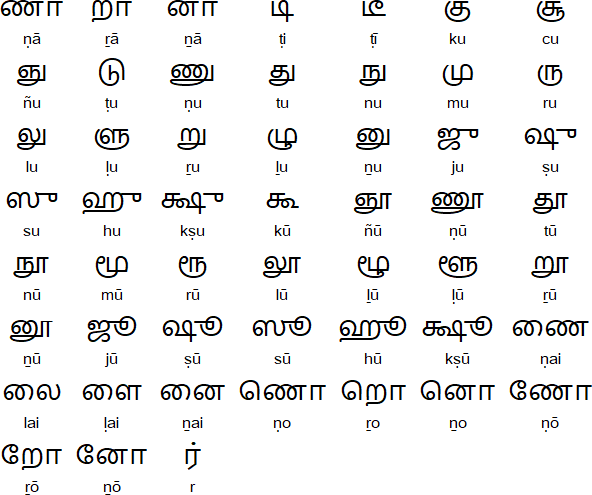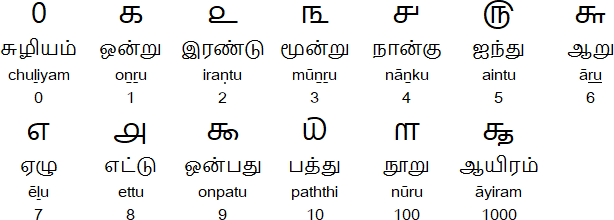Tamil is a Dravidian language spoken mainly in southern India and Sri Lanka, and also in Malaysia, the UK, South Africa, Canada, the USA, Singapore, France, Mauritius, and many other countries.
According to the 2001 Indian census, there were 60.8 million speakers of Tamil in India. [source]. According to 2012 censuses, there were just over 3 million Tamils in Sri Lanka, and 1.8 million Tamils in Malaysia. There are also Tamil populations of more than 100,000 in the UK, South Africa, Canada, the USA, Singapore, France and Réunion [source]. The total number of Tamil speakers is about 67.5 million.
In India Tamil is spoken mainly in the state of Tamil Nadu, and the Indian Union Territory of Puducherry. There are also significant numbers of Tamil speakers in Kerala, Karnataka, Andhra Pradesh, and Telangana and the Union Territory of the Andaman and Nicobar Islands..
Tamil is used as a language of education in Malaysia and Singapore.
The earliest known inscriptions in Tamil date back to about 500 BC. Tamil literature started to apper in 300 BC, and the language used until the 700 AD is known as Old Tamil. From 700-1600 AD the language is known as Middle Tamil, and since 1600 the language has been known as Modern Tamil.
Tamil was originally written with a version of the Brahmi script known as Tamil Brahmi. By the 5th century AD this script had become more rounded and developed into the Vaṭṭeḻuttu script. In the 6th century during the Pallava dynasty (275-897 AD), a new script for Tamil, known as the Chola-Pallava script, was devised. It also used some letters from Vaṭṭeḻuttu in Sanskrit loanwords. By the 8th century, the Chola-Pallava script was used instead of Vaṭṭeḻuttu in the northern part of the Tamil-speaking area, although Vaṭṭeḻuttu continued to be used in the south until the 11th century. During the next few centuries the modern Tamil script evolved from the Chola-Pallava script.
During the 19th century the Tamil script was simplified to make it easier to typeset. Further simplifications in the 20th century included the regularisation of vowel markers.
The Tamil alphabet is well suited to writing literary Tamil, centamiḻ (செந்தமிழ்). However it is ill-suited to writing colloquial Tamil, koṭuntamiḻ (கொடுந்தமிழ்). During the 19th century, attempts were made to create a written version of the colloquial spoken language. Nowadays the colloquial written language appears mainly in school books and in passages of dialogue in fiction.
Tamil is also written with a version of the Arabic script known as Arwi by Tamil-speaking muslims.


Some consonants have different pronunciations depending on their position in a word, or the letters next to them.

The numerals rarely appear in modern Tamil texts. Instead, 'Arabic' numerals (1, 2, 3, etc.) are used.

Download script charts for Tamil (Excel)

Maṉitap piṛaviyiṉar čakalarum #269;utantiramākavē piṛakkiṉṛaṉar; avarkaḷ matippilum urimaikaḷilum čamamāṉavarkaḷ. Avarkaḷ niyāyattaiyum maṉačāṭčiyaiyum yaṛpaṇpākap peṛṛavarkaḷ. Avarkaḷ oruvaruṭaṉoruvar čakōtara uṇarvup pāṅkil naṭantukoḷḷal vēṇṭum.
Hear recording of this text by Muralikrishnan Ramasamy
All human beings are born free and equal in dignity and rights. They
are endowed with reason and conscience and should act towards one another
in a spirit of brotherhood.
(Article 1 of the Universal Declaration of Human Rights)
Information about Tamil | Arwi Arabic script for Tamil | Phrases | Numbers | Time | Family words | Tower of Babel | Books about Tamil on: Amazon.com and Amazon.co.uk [affilate links]
Information about Tamil
http://en.wikipedia.org/wiki/Tamil_language
https://en.wikipedia.org/wiki/Tamil_phonology
http://en.wikipedia.org/wiki/Tamil_literature
http://en.wikipedia.org/wiki/Tamil_people
https://sites.google.com/site/sarvabhashin/en/ta
https://www.howtolearnalanguage.info/languages/tamil/alphabet
Online Tamil lessons
https://www.learntamil.com/
http://polymath.org/tamil.php
http://ilanguages.org/tamil.php
https://mylanguages.org/learn_tamil.php
http://ilovelanguages.org/tamil.php
Online Tamil dictionaries
https://agarathi.com/
http://www.dictionary.tamilcube.com
http://www.tamildict.com
https://dsal.uchicago.edu/dictionaries/tamil/
https://www.shabdkosh.com/dictionary/english-tamil
https://www.shabdkosh.com/dictionary/english-tamil
https://www.lexilogos.com/english/tamil_dictionary.htm
Free Tamil fonts
http://www.azhagi.com/freefonts.html
http://www.wazu.jp/gallery/Fonts_Tamil.html
Online Tamil radio
http://www.slbc.lk
http://www.bbc.co.uk/tamil/
http://www.ctbc.com
Tamil names
http://tamilcube.com/babynames/tamil-baby-names.aspx
http://babynames.tamilstar.com/
Tamil songs
http://tamilsongslyrics.in
https://samadada.com/tamil-folk/
Badaga, Brahui, Dhundari, Gondi, Irula, Jatapu, Kannada, Kodava, Kolam, Konda, Koya, Kurukh, Malayalam, Malto, Mukha Dora, Ravula, Sankethi, Savara, Sunuwar, Suriyani Malayalam, Tamil, Telugu, Toda, Tulu, Yerukula
Ahom, Aima, Arleng, Badagu, Badlit, Basahan, Balinese, Balti-A, Balti-B, Batak, Baybayin, Bengali, Bhaiksuki, Bhujimol, Bilang-bilang, Bima, Blackfoot, Brahmi, Buhid, Burmese, Carrier, Chakma, Cham, Cree, Dehong Dai, Devanagari, Dham Lipi, Dhankari / Sirmauri, Ditema, Dives Akuru, Dogra, Ethiopic, Evēla Akuru, Fox, Fraser, Gond, Goykanadi, Grantha, Gujarati, Gunjala Gondi, Gupta, Gurmukhi, Halbi Lipi, Hanifi, Hanuno'o, Hočąk, Ibalnan, Incung, Inuktitut, Jaunsari Takri, Javanese, Kaithi, Kadamba, Kamarupi, Kannada, Kawi, Kharosthi, Khema, Khe Prih, Khmer, Khojki, Khom Thai, Khudabadi, Kirat Rai, Kōchi, Kodava Lipi, Komering, Kulitan, Kurukh Banna, Lai Tay (Tai Yo), Lampung, Lanna, Lao, Leke, Lepcha, Limbu, Lontara/Makasar, Lota Ende, Magar Akkha, Mahajani, Malayalam, Meitei (Modern), Manpuri (Old), Marchen, Meetei Yelhou Mayek, Meroïtic, Masarm Gondi, Modi, Mon, Mongolian Horizontal Square Script, Multani, Nandinagari, Newa, New Tai Lue, Ojibwe, Odia, Ogan, Pahawh Hmong, Pallava, Phags-pa, Purva Licchavi, Qiang / Rma, Ranjana, Rejang (Kaganga), Sasak, Savara, Satera Jontal, Shan, Sharda, Sheek Bakrii Saphaloo, Siddham, Sinhala, Sorang Sompeng, Sourashtra, Soyombo, Sukhothai, Sundanese, Syloti Nagri, Tagbanwa, Tai Noi, Takri, Tamil, Tanchangya (Ka-Pat), Tani, Thaana, Telugu, Thai, Thirke, Tibetan, Tigalari, Tikamuli, Tocharian, Tolong Siki, Vatteluttu, Warang Citi
Page last modified: 21.08.25
[top]
You can support this site by Buying Me A Coffee, and if you like what you see on this page, you can use the buttons below to share it with people you know.

If you like this site and find it useful, you can support it by making a donation via PayPal or Patreon, or by contributing in other ways. Omniglot is how I make my living.
Note: all links on this site to Amazon.com, Amazon.co.uk
and Amazon.fr
are affiliate links. This means I earn a commission if you click on any of them and buy something. So by clicking on these links you can help to support this site.
[top]